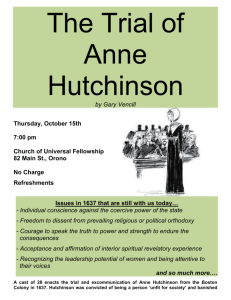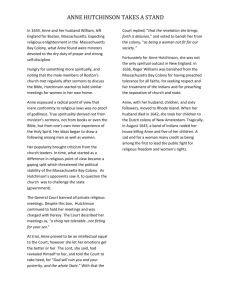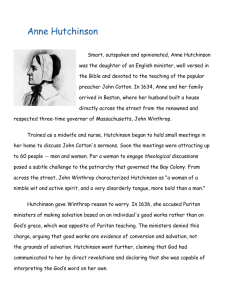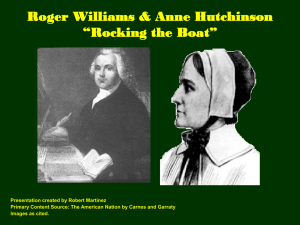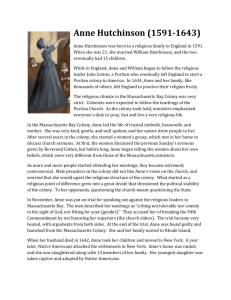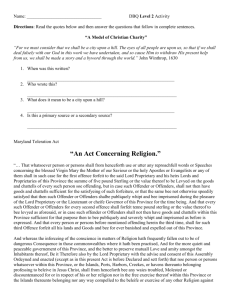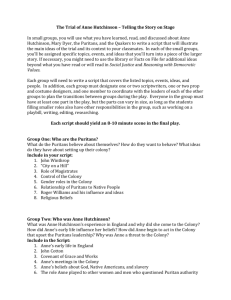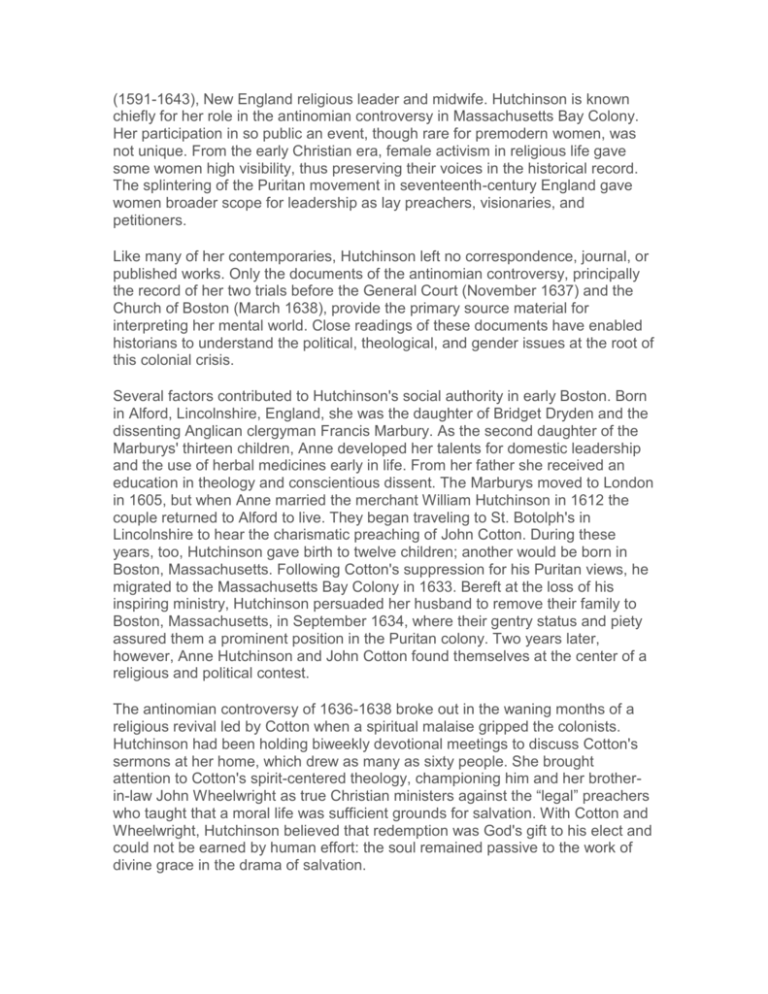
(1591-1643), New England religious leader and midwife. Hutchinson is known
chiefly for her role in the antinomian controversy in Massachusetts Bay Colony.
Her participation in so public an event, though rare for premodern women, was
not unique. From the early Christian era, female activism in religious life gave
some women high visibility, thus preserving their voices in the historical record.
The splintering of the Puritan movement in seventeenth-century England gave
women broader scope for leadership as lay preachers, visionaries, and
petitioners.
Like many of her contemporaries, Hutchinson left no correspondence, journal, or
published works. Only the documents of the antinomian controversy, principally
the record of her two trials before the General Court (November 1637) and the
Church of Boston (March 1638), provide the primary source material for
interpreting her mental world. Close readings of these documents have enabled
historians to understand the political, theological, and gender issues at the root of
this colonial crisis.
Several factors contributed to Hutchinson's social authority in early Boston. Born
in Alford, Lincolnshire, England, she was the daughter of Bridget Dryden and the
dissenting Anglican clergyman Francis Marbury. As the second daughter of the
Marburys' thirteen children, Anne developed her talents for domestic leadership
and the use of herbal medicines early in life. From her father she received an
education in theology and conscientious dissent. The Marburys moved to London
in 1605, but when Anne married the merchant William Hutchinson in 1612 the
couple returned to Alford to live. They began traveling to St. Botolph's in
Lincolnshire to hear the charismatic preaching of John Cotton. During these
years, too, Hutchinson gave birth to twelve children; another would be born in
Boston, Massachusetts. Following Cotton's suppression for his Puritan views, he
migrated to the Massachusetts Bay Colony in 1633. Bereft at the loss of his
inspiring ministry, Hutchinson persuaded her husband to remove their family to
Boston, Massachusetts, in September 1634, where their gentry status and piety
assured them a prominent position in the Puritan colony. Two years later,
however, Anne Hutchinson and John Cotton found themselves at the center of a
religious and political contest.
The antinomian controversy of 1636-1638 broke out in the waning months of a
religious revival led by Cotton when a spiritual malaise gripped the colonists.
Hutchinson had been holding biweekly devotional meetings to discuss Cotton's
sermons at her home, which drew as many as sixty people. She brought
attention to Cotton's spirit-centered theology, championing him and her brotherin-law John Wheelwright as true Christian ministers against the “legal” preachers
who taught that a moral life was sufficient grounds for salvation. With Cotton and
Wheelwright, Hutchinson believed that redemption was God's gift to his elect and
could not be earned by human effort: the soul remained passive to the work of
divine grace in the drama of salvation.
The effect of Hutchinson's meetings was divisive, and her supporters composed
a significant faction in the colony. A ministerial synod examined Cotton and
cleared him from the charge of heresy; the investigation then focused on
Hutchinson and Wheelwright. In contrast to Cotton, Hutchinson and her brotherin-law took their radical spirituality to an extreme position. Cotton's style was
mediative; theirs was adversarial. Consequently, Hutchinson and her supporters
were banished by the General Court of Massachusetts; and the result of her trial
by the Church of Boston was excommunication. The Hutchinsons went to
Aquidneck in Narragansett Bay. In 1642 when William Hutchinson died, his
widow and the six youngest children moved to New York where all but one
daughter were killed in an Indian raid in 1643.
The domestic setting for Hutchinson's leadership is key to understanding the role
of premodern women in religious life. It was among her female neighbors in need
of her medical skills that she first communicated her controversial religious ideas.
Her devotional meetings were also common practice among the early Puritans.
Like many religious movements, early Puritanism was a household religion. With
its institutionalization, women lost the authority they had exercised in the
formative domestic phase. Such was the case in Massachusetts where John
Winthrop and company were intent on building a godly society protected by the
coordinate powers of church and state. The enterprise demanded a new
emphasis on outward morality, or sanctification, that would bolster the authority
of both ministers and magistrates. But Hutchinson's prophetic stress on the
indwelling Holy Spirit, although an authentic strain of Puritan belief, empowered
the laity at the expense of the ministry. Moreover, her claim to immediate
revelation was especially threatening to the advocates of law and order. A
generation later a similar contest would be waged against the Quakers, some of
whom had been among Hutchinson's supporters.
Francis J. Bremer, ed., Anne Hutchinson: Troubler of the Puritan Zion (1981);
David D. Hall, ed., The Antinomian Controversy, 1636-1638: A Documentary
History, rev. ed. (1990); Amy Lang, Prophetic Woman: Anne Hutchinson and the
Problem of Dissent in the Literature of New England (1987).
Barbara Ritter Dailey
The Reader's Companion to American History. Eric Foner and John A. Garraty,
Editors. Copyright © 1991 by Houghton Mifflin Harcourt Publishing Company. All
rights reserved.
Biography-ANNEHUTCHINSON–A Puritan Rebel
1590-1643
ANNE MARBURY was an English girl who lived in Lincolnshire, near the town
of Boston. Her father was a Puritan minister, preach-ing there and in London. In
Lincolnshire Anne passed her girlhood, doubtless hearing a great deal of
theological controversy and religious discussion, for this was the time of the
Puritan revolt in England, and of great religious excite-ment. Naturally intelligent
and earnest, her men-tal powers were aroused and quickened.
At an early age
she married William Hutchin-son, "a very honest and peaceable man of good
estate." And in 1634 with her husband and children she journeyed to America—
the outcome of the Reverend John Cotton's leaving England because of his
persecution by the bishops.
Anne Hutchinson had been one of his most ardent dis-ciples in the church at
old Boston, and was now to sit under him in the new Boston.
It was a pleasant voyage of seven weeks, in the good ship Griffen. There were
over a hundred passengers, among them two ministers, so you may be sure there
were sermons and prayers and religious discussions all during the crossing. Anne
wanted to participate in these discussions, and indeed she did! She was so
outspoken in her preaching that, when they landed, one of these ministers
reported her to the governor as holding dangerous beliefs. Though her
husband was accepted at once, the colony leaders took a week's time to look into
her liberal views, and then examined her rigorously before admitting her to
membership in the church.
Massachusetts, you remember, was settled by
Puritans who had met persecution in England, and had braved the dangers of the
long voyage and the greater dangers of hunger and illness in a new land, in order
to worship God in their own way.
In accomplishing this goal they became as intolerant as those from whom they
had fled. Indeed there was a far closer relation of church and state in
Massachusetts than in England. The only liberty the fathers allowed was the
liberty to believe just as they believed. They were right, others were wrong, and
on this theory they regulated everything, both religious and civil.
Until their
own house could be built, Mistress Anne Hutchinson and some of the children
lived at the Reverend Cotton's; and for the three years the family remained in
Boston, their home was across the street from John Winthrop's. Almost
immediately this house became the social center of the town and Anne
Hutchinson had a leading place among the three hundred inhabitants and the
fast friendship of the brilliant young Englishman, Sir Harry Vane, then serving a
term as governor of the colony. The women loved her for her goodness of
heart, her cheerful neighborliness, her great skill in nursing. Both men and
women welcomed her intellectual and magnetic personality. She had a vigorous
mind, a dauntless courage, a natural gift for leadership; she was capable,
energetic, amiable.
And there was another reason why the women liked her.
The colonists had two church services on Sunday, with sermons sometimes three
hours long; Thursday lectures, and a Saturday night meeting. There was also
during the week religious discussion for the men. Mrs. Hutchinson started
meetings for women—a new departure, for never before had women met for
independent thought and action. At first this won high approval. The women—
forty, sixty, sometimes eighty of them, even a hundred, for they came from nearby towns as well as from Boston homes—were soon holding regular meetings to
review the sermons of the Sunday before, with Mistress Anne's comment and
interpretation.
"All the faithful embraced her conference," a contemporary
record describes the gatherings, "and blessed God for her fruitful
discourses."
But from a review of the sermons to discussion and criticism of
them and the ministers as well was a short step. It soon began to be said that
Anne Hutchinson cast reproaches on those who preached "a covenant by
works" instead of the "covenant by grace" in which she fervently believed. A
Covenant by Works, according to some, promised life for obedience and death for
disobedience, according to the Bible. A covenant by Grace, on the other hand,
promises eternal blessing for all people who trust in the promises of
God.
Such freedom of speech could not be tolerated by the good Puritans, and
a theological dispute arose which threatened the very life of the colony. There
were two parties, grace and works. Politics became a matter of Hutchinson
opinions, for political lines and religious lines coincided exactly. Indeed there was
no separation of church and state; the leaders of one controlled the policy of the
other.
From the beginning of the colony the preachers had had an unlimited
influence. Now they complained that "more resort to Mrs. Hutchinson for council
about matters of conscience than to any minister in the country." Moreover this
grace and works difficulty was carried into every phase of life. Some people
turned their backs contemptuously and walked out of meeting when a preacher
not under a covenant of grace entered the pulpit. Others interrupted the services
with questions of controversy. Indeed it was carried so far that when the Pequot
Indians became aggressive and dangerous and it was necessary to send troops
against them, the Boston soldiers refused to be mustered into service, because the
chaplain, drawn by lot, preached a covenant of works, and they disagreed with his
Sunday sermon! The whole town of Boston, the whole colony of
Massachusetts, church and state, were set in commotion and turmoil. This
theological quarrel was a stumbling block in the way of all progress.
The
ministers so freely criticized were embittered and determined to call Mistress
Hutchinson and her doctrines to account. So they summoned a meeting of all the
clergymen and magistrates of Massachusetts, who met in Cambridge for full three
weeks, discussing some eighty-two opinions which they condemned—some as
dangerous, some blasphemous, some erroneous, and all unsafe. The
women's meetings were forbidden as "disorderly and without
rule."
Forbidden to speak in public, Anne Hutchinson continued to hold
meetings in her own house. Roger Williams, who was shortly to feel the full
displeasure of the Puritan leaders, said that in view of her usefulness as a nurse
and a neighbor, she ought to be allowed to speak when she chose and to say what
she wished, "because if it be a lie, it will die of itself; and if it be truth, we ought to
know it."
The authorities in Massachusetts were in constant dread of losing
their charter, which was especially endangered by reports of disorderly
proceedings. And certainly nothing had provoked so much disorder and sedition
as the course taken by Mistress Anne. Both politically and religiously they
felt it a duty to suppress her party. So in October, 1637, she was brought to trial
before the General Court of Massachusetts, sitting in the meeting house in
Cambridge.
"Mrs. Hutchinson," said Winthrop, presiding, "you are called here as one of those
that have troubled the peace of the commonwealth and the churches here. . . .
You have maintained a meeting and an assembly in your house that hath been
condemned by the general assembly as a thing not tolerable, nor comely in the
sight of God nor fitting for your sex, and notwithstanding that was cried down
you have continued the same. Therefore we have thought good to send for
you to understand how things are, that if you be in an erroneous way we may
reduce you that so you may become a profitable member here among us,
otherwise if you be obstinate in your course that then the court may take such
course that you may trouble us no further."
This trial was at once a civil,
judicial and religious process, lasting through two long weary days. Extremely
tiring and exhausting must have been the examination, for the deputy governor
complained that they would all be sick from fasting! The forty-three men who
tried her were like an English court of High Commission, almost like the
Inquisition. For Anne Hutchinson had no lawyer. They even kept her standing
until she almost fell from fatigue, before they allowed her to answer
seated.
Governor and deputy, magistrates and judges were arrayed against
her. They examined and cross-examined her. They badgered and insulted and
sneered at her. They browbeat and silenced her witnesses, in absolute disregard
of fair play. Only one man of them all defended her, saying with spirit, "There is
no law of God that she has broken, nor any law of the country, and she deserves
no censure."
They found it no easy thing to make her trap herself. Their fine
theological distinctions were familiar ground to her. She had a ready grasp of
scriptural authority, and wonderful skill in using her intellectual power to prove
her spiritual position. With the ability and clearness of a trained advocate she
conducted her case, showing tact and judgment and self-reliance, and always
with demeanor of a lady. What Winthrop described as her "nimble wit and
voluble tongue" never deserted her, though she was hard pressed by the keenest
minds of the colony.
When they failed to prove her women's meetings were
opposed to the Bible, they fell back on the argument of their authority and said,
"We are your judges, and not you ours, and we must compel you to it."
When
she answered to some of their questions, "That's matter of conscience, sir," stern
Governor Winthrop replied, "Your conscience you must keep, or it must be kept
for you."
It was the deputy-governor who summed the whole matter
up:
"About three years ago we were all in peace. Mrs. Hutchinson from that
time she came hath made a disturbance. . . . She hath vented divers of her strange
opinions and hath made parties. . . . She in particular hath disparaged all our
ministers. . . . Why this is not to be suffered, and therefore being driven to the
foundation and it being found that Mrs. Hutchinson . . . bath been the cause of
what is fallen out, why we must take away the foundation and the building will
fall." The result of the trial might have been announced before it opened.
Read how the court record finishes:
"Governor Winthrop (Speaking): The
Court hath already declared itself satisfied concerning the things you hear, and
concerning the troublesomeness of her spirit, and the danger of her course
amongst us, which is not to be suffered. Therefore if it be the mind of the Court
that Mrs. Hutchinson, for these things that appear before us, is unfit for our
society, and if it be the mind of the Court that she shall be banished out of our
liberties, and imprisoned till she be sent away, let them hold up their
hands."
All but three held up their hands.
"Governor
Winthrop(Speaking): Mrs. Hutchinson, you hear the sentence of the Court. It is
that you are banished from out our jurisdiction as being a woman not fit for our
society, and you are to be imprisoned till the Court send you away.
"Mrs.
Hutchinson (speaking): I desire to know wherefore I am banished.
"Governor
Winthrop(Speaking): Say no more. The Court knows wherefore, and is
satisfied."
Semi-imprisonment Mistress Anne had all that winter, in the
house of a man in Roxbury whose brother was one of her most bitter enemies.
She was sent up to Boston to be admonished by the elders of the church; and
when she refused to sign an absolute retraction of her opinions, and would not
promise to hold any more meetings, she was excommunicated.
The sentence
of banishment was carried out in March of 1638. To the sorrow of many of the
colonists, William Hutchinson went with his wife. He refused their invitations to
remain, saying, "For I am more dearly tied to my wife than to the church. . . . And
I do think her a saint and servant of God." With husband and children and
seventy friends Mistress Anne went to Rhode Island where Roger Williams
offered the party a friendly refuge. From the Indians they bought an island,
for ten coats, twenty hoes, and forty fathoms of white wampum; and lived there
until 1642 when William Hutchinson died.
Hearing a rumor that
Massachusetts was trying to extend her control over Rhode Island, the settlers
left for a new site in the Dutch colony to the west. A year later a friendly Indian
one morning visited Anne Hutchinson's house. Seeing that the family was
defenseless he returned that night with others of his tribe, killed the sixteen
members of the household and set fire to the buildings.
When Governor
Winthrop heard of this massacre he declared that "the bare arm of God displayed
itself in her death." Ministers in Massachusetts announced it a divine judgment
supporting their verdict. One of them wrote, "God's hand is more apparently
seen herein to pick out this woeful woman to make her and those belonging to
her an unheard-of heavy example above others." But Mistress Anne's friends
charged the guilt of her murder upon the colony and declared it was the judgment
of the Lord on Massachusetts.
An able woman, clever, brilliant, possibly
indiscreet in her criticism of the ministers, Anne Hutchinson's life was a
strange mixture of consecration and conflict, of kindliness and contention, with a
tragic end. She was fighting the first battle in a long series to be fought out in
America —for religious toleration and for freedom of thought and speech, for
liberty of conscience, for a true democracy in religion.

